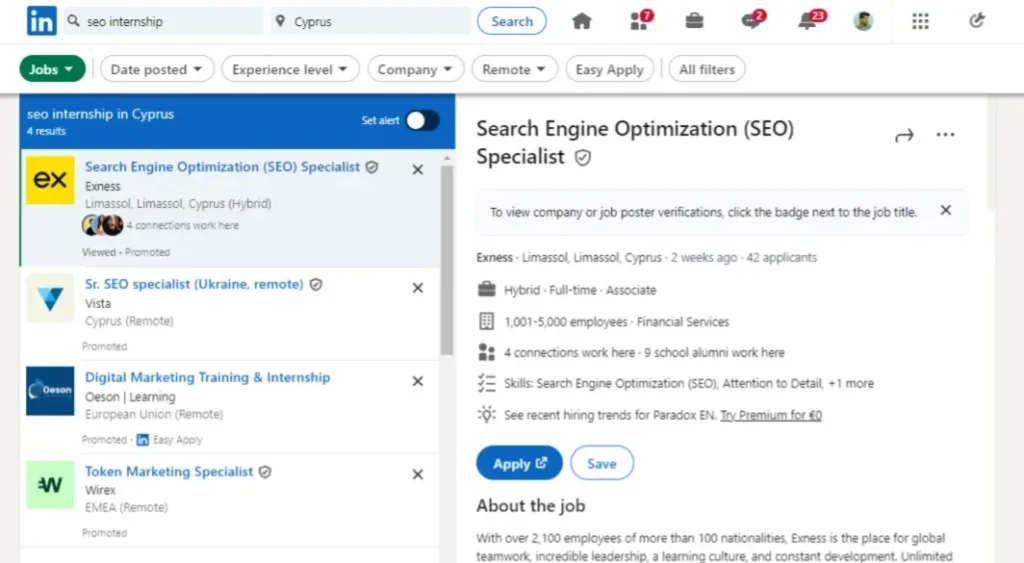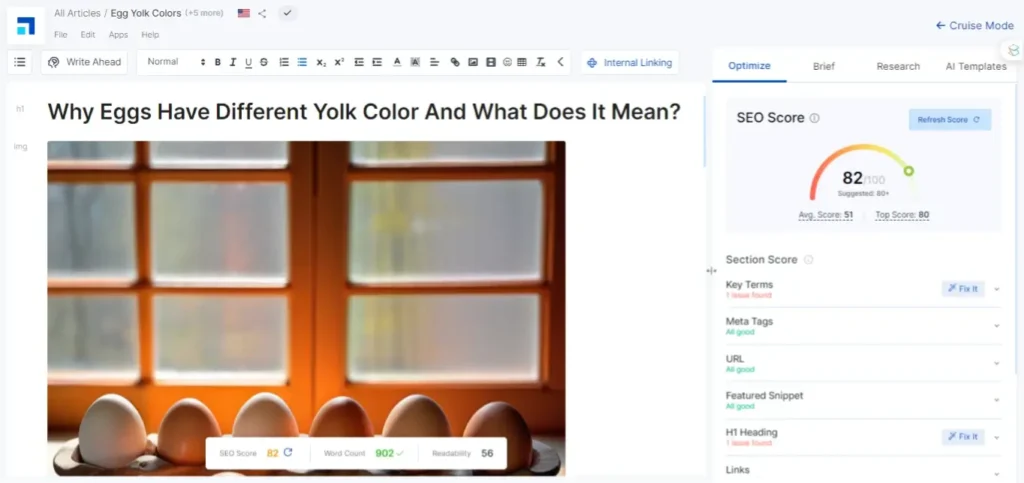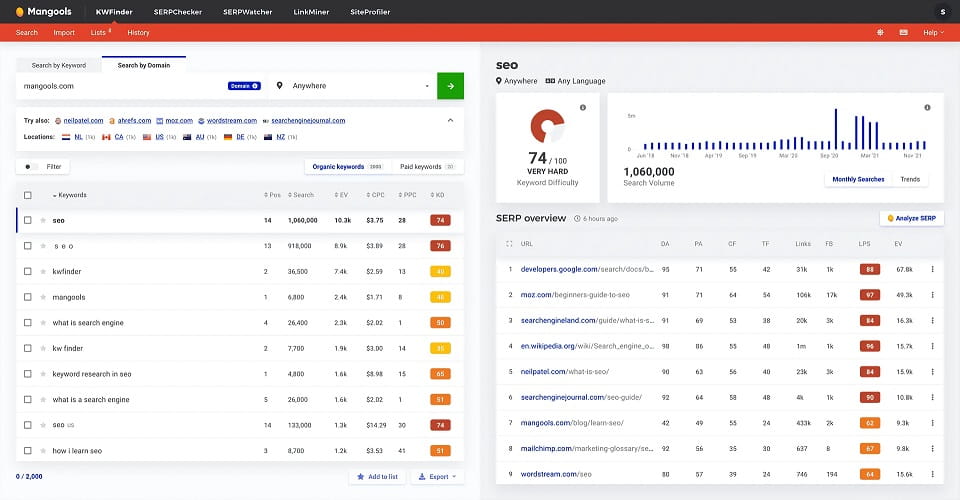How To Become a Successful SEO Content Writer And Start Raking in the Cash

Once, I was just like you – lost in the maze of SEO content writing, unsure of how to navigate the world of keywords and search intent. I know it’s challenging, but don’t worry. In this post, we’ll simplify it all.
We’ll take a dive into the fundamentals of SEO content writing, starting with internships and courses, diving into keyword mastery, and revealing how to keep up with the latest trends.
By the end, you’ll have a clear roadmap to becoming a successful SEO content writer.
How To Become a SEO Writer
So, how do you become a SEO content writer? Well, there are a lot of methods and different schools of thought on how to start your SEO content writing journey.
The “mother of all methods” though is to dip your feet in the water and start producing content for yourself.
But, I don’t want to leave you like that, so here’s what I think you can become a successful content writer:
Join a Local SEO Agency as an Intern
Taking on an internship at a local SEO agency is like hitting a gold mine for experience and learning.
I remember my early days, working side-by-side with savvy professionals. It was like being in the front row of a live SEO masterclass every day.
You don’t just watch and learn; you get your hands dirty, applying lessons learned in real-time. Believe me, there’s no substitute for that kind of hands-on experience when it comes to landing future gigs.
When you’re in an agency, you’re among folks who eat, sleep, and breathe SEO. It’s an incredible opportunity to build your network while honing your skills.
How to find Internship Opportunities?
- Go to Linkedin
- On the top menu, click the “jobs” item.
- Search for “seo internship and choose your country or city.
- Hit the search button and voila. SEO Internships in your area.
Now, don’t expect to master everything overnight. SEO is a vast field and it takes time to grasp all its nuances. But as you journey through your internship, you’ll slowly but surely pick up the ropes. Just stay patient, keep learning, and never hesitate to ask questions. Remember, everyone was a beginner once.
Scavenge the Web and YouTube
Learning SEO content writing doesn’t have to cost you a penny, at least not right away. The internet and YouTube are jam-packed with free resources, and I can tell you from my experience that they’re pretty good.
Try typing in ‘SEO copywriting secrets’ or something along those lines in the search bar and you’ll see what I mean.
There are some really cool people out there who know their SEO stuff, and learning from them can be a game-changer.
- Take Jared Bauman, for instance. The guy runs a super useful newsletter that’s about blogging and subsequently SEO.
- Or Jacky Chou from Indexsy with his Marketing Letter (Newsletter). This guy drops some serious alpha..
- And then there’s the SEO Truth’s channel on YouTube. This guy – although a bit “cocky” don’t just skim the surface; he dive deep into SEO tactics, which is something I’ve always appreciated. He explain things in a way that’s easy to understand, and I’ve picked up a lot from his videos.
- Denali & Associates is another resource you might find handy. They’re probably the best SEO agency in Racine, and their blog is filled with some serious info when it comes to copywriting and SEO in general.
What I’m trying to say is that these free resources are among the “places to start” “scavenging” for SEO copywriting related information. Although they might not be structured as an SEO copywriting course I’ve mentioned earlier it is a good start if you don’t want to invest some money on knowledge.
Engage with the community
So, what’s the first thing you have to do? Get onto those SEO newsletters. They’ve got all the latest trends and updates, and they will really helped you stay ahead of the game.
But don’t just stop at newsletters. There’s a ton of SEO pros out there who are sharing their wisdom on X (former Twitter). Here are some popular accounts on X that deal mostly with SEO and copywriting:
- Andrew Gould (@AndrewWriteCopy) – a freelance copywriter who shares insights and tips on copywriting and conversion optimization.
- Jeff Putnam (@TheJeffPutnam) – a marketing expert who shares insights on marketing and SEO.
- Jay Hustler (@JayHustler) – a marketing and SEO expert who shares tips and strategies on increasing website traffic and conversions2.
- Joanna Wiebe (@CopyHackers) – a copywriting expert who shares insights and tips on writing copy that converts3.
- Brian Clark (@brianclark) – a marketing expert who shares insights on content marketing and copywriting3.
These accounts offer valuable insights and tips on SEO and copywriting, making them great resources for anyone looking to improve their skills in these areas.
YouTube is another platform that I’ve found really valuable. There are plenty of SEO experts sharing step-by-step tutorials and case studies.
Some suggestions are:
- Neil Patel: Neil Patel’s YouTube channel offers valuable insights on SEO, online entrepreneurship, and digital marketing strategies.
- Ahrefs: Ahrefs, an all-in-one SEO toolset, has a YouTube channel with practical optimization tips, including link-building tactics, SEO copywriting, and keyword planning.
- Backlinko: Backlinko’s YouTube channel, with over 520,000 subscribers, focuses on SEO strategies, content marketing, and improving website performance.
- Kopywriting Kourse: Kopywriting Kourse, known for its copywriting expertise, offers valuable tips on copywriting, finding work, and producing specific materials like landing pages.
And then there’s Facebook. There are groups dedicated to SEO where people are constantly exchanging advice, answering questions, and sharing their experiences. Again, I suggest joining these Facebook Groups:
- SEO Signals Lab – Active and helpful community for all levels of SEO knowledge.
- The Proper SEO Group – Grey hat discussion community for all SEO levels.
- Niche Pursuits – Group for niche websites and digital marketing discussions.
- Dumb SEO Questions – A supportive space for answering any SEO question.
- SEO Masters Academy – Land of SEO and marketing experts for learning and networking.
Buy a copywriting course
If you don’t want to lose time and get overwhelmed with all these newsletters, videos, etc, taking a copywriting course can seriously upgrade your SEO writing chops and speed things up. One that I’d recommend is The Official ClickBank Copywriting Guide.
It’s geared towards teaching you the know-how to churn out top-notch copy that actually converts on the ClickBank affiliate network.
I can tell you from my own experience, investing in a course like this gives you a real leg-up in understanding how to write for the search engines and at the same time persuade your readers to actually take action.
This is key when it comes to creating SEO content that hits the mark. You don’t just learn how to write stuff that people want to read, but you also learn how to tweak your writing to meet specific marketing goals.
Start your own blog
Creating your own blog is a time-consuming process but for me, it is the most important move when it comes to mastering the art of SEO content writing.
Trust me, I’ve been doing this for over a decade. If I haven’t started writing myself, I wouldn’t sharpen my SEO writing skills.
It’s through creating and ranking content that you really learn the ropes. There’s no better teacher than experience in this game. You have to dive in, make mistakes, and learn from them if you really want to become proficient at this.
Luckily, there’s a ton of online resources that teach you how to start a blog. It doesn’t need to be something fancy. Just a blog for you to start writing.
Here’s a a 10-minute video that shows how to start a blog with Hostinger. Hostinger is one of my favorite Hosting providers because its cheap, has great customer support and offers so much (free SSL, free domain, easy UI, etc).
Plus, I’ve got this discount coupon that will save you an extra 7% OFF on any plan you choose. The discount code is BNBOT7.
Anyway, here’s the video
This whole process of trial and error, and learning from your own mistakes is what’ll hone your skills and build your confidence as an SEO content writer. So, go ahead, set up your blog, start writing.
How To Make Money as an SEO Content Writer?
Now that you’ve joined an SEO agency, followed a bunch of SEO pros and joined SEO and copywriting communities, bought that course and started your new blog, it’s time to get to the next level.
To start making money..
But, you first have positioning yourself as an SEO expert in the market to start acquiring, customers and business opportunities.
Also – although this might sound kinda strange – doing so, you are changing your mentality and brainwashing yourself on becoming THE BEST.
Here’s what you need to do..
1. Buy a subscription to an Ai Writing Assistant That has integrated an SEO optimization tool
In my decade-long journey as an SEO and blogger, I’ve learned a thing or two about the importance of optimizing content for search engines.
But honestly, it’s a bit daunting.. It’s like trying to hit a moving target, and when you do, another one can come and split your arrow in half – just like Robin hood.
One day you’re ranking high, the next day you’re not. That’s where AI writing assistants with integrated SEO content optimization can be a game changer.
There are probably over 100 AI writing tools as of writing this article, but not all of them offer an SEO content optimization feature.
What pioneered by SurferSEO, now it is included in Ai writing assistants like Scalenut, Writesonic, and Jasper.
So, to recap, these software write and optimize the content. No more guesswork.
They guide you on using the right LSI keywords, help you balance your word count with SERPs, and optimize your headings. They even nudge you if you’re overstuffing keywords.
Now, don’t get me wrong. These tools don’t write the articles for you. They’re not magic. But they do make the process more efficient.
Btw, you can use this discount code FIRST10 to save 10% of you subscription with Scalenut – if you are serious about your SEO writing game.
2. Start positioning yourself as an SEO copywriter
The next step is to create an account on Fiverr and create SEO writing gig. These gigs can be something like, ‘I can write SEO optimized articles – or something like that anyway. Check what others are doing and try to make it better.
TIP‘: You can take advantage of free AI tools like Perplexity, Claude, ChatGPT etc, to make your gigs stand out. Ask them to “Write your gig description with a [type of writing] style. Be [friendly/witty/etc]. [X number] words.
You can also create a free about.me page. It’s a great and free way to position yourself as an SEO writer and an expert.
Now, let’s move onto your personal website. Again, buy an affordable hosting plan from Hostinger and use Kadence theme to install a ready-made and free starter template like this one..

Use these tools to build a sleek personal website to showcase your work. Also, don’t forget to use the discount code BNBOT7 for extra savings.
Finally, let’s not forget about LinkedIn. It’s like the professional’s Facebook, right?
It’s a great place to write articles about content marketing and SEO. This way, you not only showcase your expertise but also attract potential clients.
3. Publish outstanding content on Guest Posting on websites
Next on the line is guest posting. But, not with crap paid content, rather than free and outstanding content that’ll make the webmaster drool..
First off, you need to locate websites within your field. You can do this by typing ‘[your field] guest post‘ into a search engine.
Once you have your list of sites, you’re halfway there. Now, you need to write the pitch.. Something like..
“Hey,
I’m an aspiring SEO copywriting and I want to build my portfolio. I saw that you accept guest posts.. Can, I write something for you? I promise it will be outstanding.. You can also provide me a keyword and I’ll craft an article around it..
What do you think?”
..OR, you can use a one of the free Ai tools that I mentioned earlier (Claude for example) to help you write an email that sounds like you’re actually talking to the website owner, not just sending a robot-generated message.
Now, let’s talk about your content. It’s got to shine.
Use your AI tool again (not the free, the paid one) to craft SEO-optimized, top-notch articles that demonstrate your know-how. Trust me, its your content’s quality is what makes or breaks your reputation.
TIP: Don’t forget to ask for an author profile to go with your post. It’s like your online business card – it adds to your credibility and gives you a nice boost to your portfolio. It also builds your E-A-T as a content writer.
4. Offer your services on Facebook SEO groups
Joining Facebook SEO groups is another lucrative opportunitiy for those in the SEO content writing field.
These groups are like bee hives, buzzing with webmasters eager for skillful writers.
As a newbie, with no reputation, starting as a budget-friendly option can work wonders. You may wonder why. Well, it’s simple, it helps you draw in more clients.
Now, you might think, ‘Pavlos, I won’t make much at first.‘ And you’re right.
But remember, at this stage, it’s more about gathering experience and less about earning big bucks.
Once you’ve finished a project, don’t shy away from asking your clients for feedback. Their opinions can be your help you refine skills.
You’ll learn more from these feedbacks than any course or book can teach you.
And here’s the best part: once you’ve got a solid portfolio under your belt and some stellar reviews to flaunt, you can start charging more. It’s all about building that reputation first, and then rolling in the dough.
Basic Tips for Creating SEO Optimized Content
To help you kick off your journey in SEO content writing, here are some basic tips to get you started:
1. Keywords Research
In my decade-long journey as an SEO expert and blogger, I’ve come to realize that robust keyword research is like the backbone for creating SEO-friendly content that really hits the mark.
Now, sometimes you might find your clients handing you a list of keywords they want to target, but more often than not, you’ll have to do the work.
How do you do that?
Well, you can kick things off with free tools like Google Autocomplete or the free versions of KeywordTool.io, and Ahrefs free version of Keyword research tool. They’re like starter packs, giving you a basic idea about popular search terms.
But, if you want to go deeper and get more specific data, you might want to consider investing in paid keyword research tools like KWFinder (cheap and very good) or Semrush. They’re worth every penny, trust me!
Over the years, one major lesson I’ve learned is the importance of pinpointing low-competition keywords. They’re like hidden gems that not everyone is tapping into, making them easier to rank for and bring in traffic.
So, my advice to you is to spend some time getting familiar with these tools. Your goal is to uncover relevant search terms that your potential readers are likely to use.
2. Learn what LSI keywords are
Apart from basic keyword research, you need to understand the concept of LSI keywords. Let me break it down for you. LSI stands for Latent Semantic Indexing.
Now, don’t let the fancy term scare you. It’s just a fancy way of saying ‘keywords that are closely related to your main keyword’.
For example:
Let’s say you’re writing about ‘apple’. Now, ‘apple’ could mean the fruit or the tech company, right?
That’s where LSI keywords come in handy. If you use words like ‘fruit’, ‘healthy’, ‘vitamin’, it helps search engines understand you’re talking about the fruit.
If you use words like ‘iPhone’, ‘Mac’, ‘technology’, it indicates you’re talking about the tech company. Makes sense, right?
Using LSI keywords can really help your SEO writing. It’s not about stuffing your article with your main keyword, which can often make it sound unnatural and even spammy. Instead, try to enrich your content with LSI keywords – those synonyms and related phrases that revolve around your topic.
For instance, if your main keyword is ‘baking cookies’, your LSI keywords could be ‘chocolate chip’, ‘oven temperature’, ‘baking sheet’, and so on. “Sprinkle” these throughout your article.
(Got it? “Sprinkle” cookies, baking… Oh, never mind.. 😤)
3. Learn about search intent
Understanding search intent is key if you want to write content that hits the mark for your audience. Now, I’ve seen Google steer away from fluff over the years – especially with the latest algorithm updates – which tells me that the game is now about pinpointing what the searcher wants.
It’s like being the world’s best mind-reader, asking, ‘What’s this searcher trying to find?’ and ‘How can I offer them that answer in the most effective way?’
To answer these two questions, you can use (again) the free AI tools.. Trust me, they’re pretty good at it..
Just “feed” them with prompts like, “What’s the user’s intent behind this keyword [keyword here]?” or “How can I best serve them with my article?” and voila, you get insights and sometimes even a suggested outline.
4. Understand basic on-page optimization
Now, there are some tricks that have consistently helped me optimize my articles. Let me share some of these insights with you.
- Make sure your main keyword is in your title. But don’t just stop at that. Use your keyword and its variations throughout the introduction and the body of your post. Word of caution though, avoid stuffing your article with keywords. Search engines don’t like that.
- Another tip, include your keyword in the meta-description. Super important as well.
- Now, let’s talk about the layout. Break your text with tables, bullet points, and relevant images. Not only does this make your article more reader-friendly, but it can also land you those coveted featured snippet positions.
- When adding images, make sure they’re optimized. Compress them to avoid slow load times and add descriptive captions and alt text. These little tweaks can make a big difference. My favorite compression tools are TinyPNG and Optimizilla.
- And here’s a bonus tip: Consider including a relevant video in your article. Just like I did above. I’ve found that this can make your page more engaging and informative.
There you have it. Simple, effective tips from my own experience that can help you improve your on-page optimization.
Remember, SEO isn’t a one-time thing. It requires patience, persistence, and a whole lot of learning. But when done right, the results are worth it!
Bottom Line
Now that you know the ropes, immerse yourself and begin your journey as an SEO content writer. Start with internships, welcome continuous learning, and don’t shy away from courses that enhance your skills.
Establish your blog, experiment with SEO tools, and actively engage in SEO communities. Put yourself out there on platforms like Fiverr and tap into social media groups.
Remember, every piece you write builds your expertise. You’ve got this—start writing and optimizing your path to success!
And.. since you are into SEO, check these SEO related articles…




